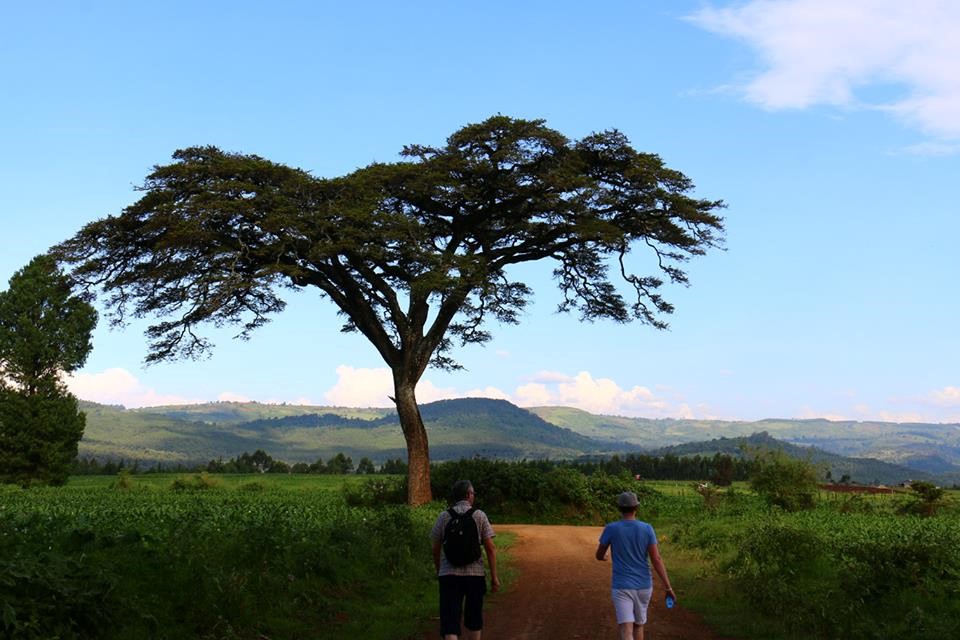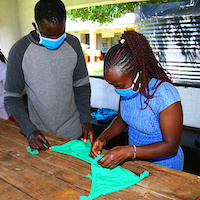My placement in Londiani - blog three by Darragh Treacy
In a series of blogs, student Darragh Treacy is sharing his experiences of working on a placement with Friends of Londiani and his recent trip to support our work in Kenya. In his last blog post he reflects on his time in Kenya.
Blog three - Life and learning
As part of my studies in International Development and Food Policy at University College Cork, I have been given the chance to work alongside Friends of Londiani, a development organisation based in Londiani, Kenya that works alongside communities in the region in order for the people here to create a sustainable improved livelihood for themselves. I began working with Friends of Londiani in March of this year and will finish placement with them in early August. As part of this placement I am currently coming to the end of a 6 week stint working with Martin, Maria and all of the Friends of Londiani Kenyan staff.
As stated in a previous post, when I arrived in Londiani it certainly took me a few days to adapt to the different environment and culture. Seeing some examples of the poverty in Kenya was also a massive eye opener for me, I came with an image in my mind and expected to see a certain level of poverty but nothing could prepare me for the reality of how some people here live from day to day. One thing I can certainly say I will take from my time in Kenya is that I now fully appreciate the work that development organisations do and now realise how vital this work is for creating better lives for people living in poverty.
In the last 6 weeks I have gotten to see much of what Friends of Londiani do for communities in Kenya. Stove Installations, water provision systems, economic empowerment schemes, lifeskills trainings, female hygiene awareness and most importantly, education in each of these areas. Seeing these programmes in action has helped me to achieve a greater knowledge of the impact which appropriate assistance can have on improving livelihoods of communities. The stove installation project was one I had been looking forward to seeing before I ever left Ireland and I got a chance to take part in an installation of a smokeless stove in a household in my last week. This programme has massive benefits attached to it for so many people. For one, Friends of Londiani facilitate trainings for people to learn how to install these stoves which acts as an income generator for them which can be used long into the future. Secondly, the new stoves release minimal smoke into the building which they are housed, this is a huge improvement to the traditional 3 stone stoves which have no mechanism to release smoke away from household members in the building. This is a simple but extremely beneficial addition to any household, from comparing surveys taken by those who have had smokeless stoves installed, the health of the households have improved drastically as they inhale less smoke.
Learning and life experience
I have seen so many programmes and the benefits they offer to communities who participate that it is hard for me to even try and begin listing them here. I would need to write a book rather than a blog post, but I can certainly say that seeing this work first hand has been a huge learning experience for me.
If programmes are implemented correctly like I have seen while here, we certainly can help to change people’s lives, as facilitators for them to improve their own lives as much as anything else which I think is one of the main things I really understand after travelling here. The only time that organisations should be giving ‘handouts’ as development catalysts is in times of crisis where people need their lives rebuilt from emergencies such as natural disasters. Other than that, all development work should be carried out alongside the people who are involved rather than doing it for them. This is to me, is the most important lesson I’ve learned while working with Friends of Londiani. Factors such as cost sharing between the organisation and the recipient along with training local people in the community to carry out work such as stove installation rather than the organisation travelling around installing stoves all contribute to sustainability. And to me, and I’m sure almost everyone involved or interested in development, sustainability is the key to ensuring any improvements made to communities lives remain intact long into the future. This vs giving people what they need, to me there is no comparison in the lasting benefits these two methods offer. 
Other than this, I’ve learned how organisations work overseas, how to work alongside a team where a language (or my accent) barrier exists, how people in Kenya live day to day and also some of the issues which they face in the process. I’ve seen some amazing landscapes, sat in on various meetings including one organised by the Irish Ambassador, took part in Kenya’s national Menstrual Hygiene Day event hosted by Friends of Londiani and even had the opportunity to meet up with my other two classmates who are also in Kenya, for a weekend where we had the chance to camp in Ndubusat with Maria and Martin and take part in one of the treks linked to the area. (On a side note, I also got the opportunity to meet up with my granduncle Fr. Brian Treacy numerous times including one successful trip to Kericho golf club, can’t win ‘em all Brian!)
There’s much more I could say about my experience with Friends of Londiani in Kenya however I could still be writing in a month’s time if I was to try and include everything. It has been a great 6 weeks for me, a trip that I will never forget for sure. I can’t thank Martin, Maria, Rose and all the Kenyan staff here in the office in Londiani enough for making it such a great trip and experience for me. It has not only been a great learning experience but also a great life experience which I will never forget. Hopefully I will have the opportunity to return at some point in the future, as a volunteer or otherwise.
Asante Sana!
Darragh Treacy
To read Darragh's first two blogs, click here for blog 1 and here for blog 2

